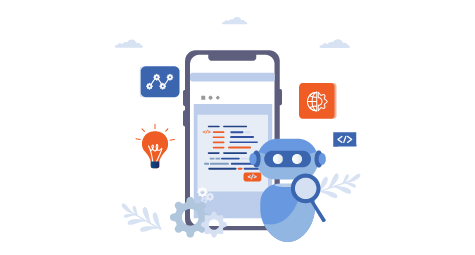Open AI’s Contribution to the Future of Mobile App Development

Developers can now create agile and intelligent mobile apps that provide a superior user experience, all thanks to Open AI's advanced technology. From chatbots and virtual assistants for seamless communication, to content creation, and image and video analysis for optimized app functionality, these features enhance the user experience. Moreover, predictive analytics, automated testing, and voice recognition improve personalization, security, and efficiency. By incorporating Open AI's advancements into mobile app development, developers can build more engaging, responsive, and secure apps for their users.
Current Trends in Mobile App Development
AI-Powered Personalization: How AI is used to create personalized user experiences.In mobile app development, AI-driven personalization optimizes user experiences by studying individual user behavior, preferences, and interactions. By using algorithms to analyze data such as browsing history, purchase history, and location, AI can deliver personalized content, recommendations, notifications, and even dynamically adjust the app interface to reflect user needs in real-time. Predictive analytics further improve this personalization by anticipating future user needs, while AI-powered chatbots and support systems provide tailored assistance. These advanced personalization features lead to higher user satisfaction, engagement, and retention rates in mobile apps.
Transforming User Interaction: AI-Powered Chatbots and Virtual Assistants in AppsIntegrating AI-driven chatbots and virtual assistants in mobile apps allows for a truly seamless user experience. These conversational AI tools understand and respond to user queries using natural language processing, enabling 24/7 support and engagement without the need for human assistance. From answering common questions and providing app guidance to handling transactions and offering personalized recommendations, these AI tools make interactions intuitive and efficient. In turn, these interactions not only enhance the user experience but also provide valuable insights into user behavior and preferences, allowing for continued app improvement.
Enhanced Security with AI: How AI helps in improving app security.AI empowers mobile app security by offering cutting-edge threat detection and mitigation capabilities. By analyzing large volumes of data with machine learning algorithms, AI can identify anomalies and patterns indicating potential security risks such as fraud or cyber-attacks. Real-time monitoring and automatic response capabilities ensure quick detection and prevention of such threats, strengthening security. AI also enhances authentication by incorporating biometric recognition and behavioral analysis, making unauthorized access more difficult. Encryption and data protection techniques powered by AI protect sensitive information, providing robust security for mobile applications and ensuring data protection from breaches.
Impact of Open AI on App Development
Streamlining Design and DevelopmentAI can significantly streamline the design and development process of mobile apps by automating repetitive tasks and optimizing workflows. Here’s how:
- 1. Automated Code Generation: AI tools can quickly create code snippets based on what developers need, saving time on writing repetitive code.
- 2. Design Assistance: AI-driven design assistance offers suggestions on design elements, layouts, and color schemes to enhance user experience.
- 3. Prototyping and Wireframing: AI can quickly create prototypes and wireframes, allowing developers to visualize and iterate on app designs more efficiently.
Content Generation and Management
AI plays a crucial role in content creation and management within mobile apps, making it easier to produce and organize content:
- 1. Automated Content Creation: AI can generate text, images, and even videos based on predefined parameters, ensuring consistent and high-quality content.
- 2. Content Personalization: Utilizing user data analysis, AI-driven personalization delivers targeted content recommendations, improving user engagement and overall experience.
- 3. Content Moderation: AI tools can automatically review and filter user-generated content, maintaining the quality and appropriateness of content within the app.
AI in Testing and Quality Assurance:
AI enhances the testing and quality assurance (QA) processes by automating various tasks and improving accuracy:
- 1.Automated Testing: AI-driven testing tools can execute a wide range of tests, from unit tests to regression tests, quickly identifying bugs and issues.
- 2.Predictive Analytics: AI can predict potential issues based on historical data, allowing developers to address problems before they occur.
- 3.Continuous Integration and Deployment: AI facilitates continuous integration and deployment (CI/CD) by automating the testing and deployment processes, ensuring that new features and updates are released smoothly and without errors.
By exploring AI in these areas, mobile app development becomes more efficient, cost-effective, and capable of delivering high-quality, personalized user experiences.
Most Asked FAQs
1. What issues can arise when AI is used in mobile app development?
Challenges include data privacy concerns, algorithm complexity, and potential biases. Snetzweb can help address these issues with expert solutions.
2. Can AI help in reducing development costs for mobile apps?
Yes, AI can automate repetitive tasks, optimize coding processes, and streamline design, potentially reducing development costs.
3. Which mobile apps are utilizing AI in practical, real-world scenarios?
Examples include personalized recommendations in streaming services, voice assistants like Siri and Google Assistant, and AI-driven customer support chatbots.
4. What are some emerging trends in AI for mobile app development?
Emerging trends include AI-powered voice assistants, advanced chatbots, real-time language translation, and AI-driven augmented reality experiences.


